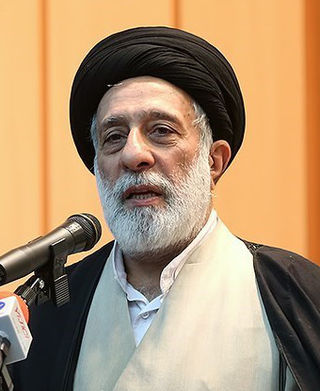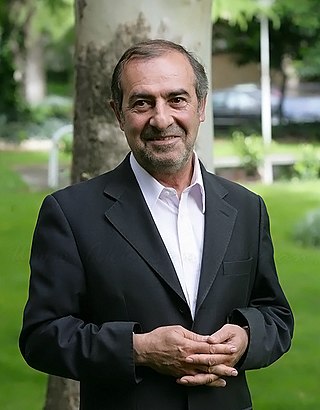
The Islamic Iran Participation Front was a reformist political party in Iran. It was sometimes described as the most dominant member within the 2nd of Khordad Front.

The Iranian parliamentary elections of February 20 and May 7, 2004 were a victory for Islamic conservatives over the reformist parties. Assisting the conservative victory was the disqualification of about 2500 reformist candidates earlier in January.

The Reformists are a political faction in Iran. Iran's "reform era" is sometimes said to have lasted from 1997 to 2005—the length of President Mohammad Khatami's two terms in office. The Council for Coordinating the Reforms Front is the main umbrella organization and coalition within the movement; however, there are reformist groups not aligned with the council, such as the Reformists Front. Masoud Pezeshkian, a reformist, was elected president following the 2024 Iranian presidential election, and was subsequently approved by the Supreme Leader on the 28th of July, having been inaugurated two days afterwards in Tehran.

Presidential elections were held in Iran 17 June 2005, with a second round run-off on 24 June. Mohammad Khatami, the outgoing president of Iran, stepped down on 2 August 2005, after serving his maximum two consecutive four-year terms according to the Islamic republic's constitution.

Mostafa Moeen is an Iranian politician, professor of pediatrics, and a human rights activist who is currently founder and president of the Front for Human Rights and Democracy in Iran. He was a presidential candidate for the 2005 Iranian presidential election. His campaign enjoyed the support of some reformist parties and organizations, headed by the Islamic Iran Participation Front (IIPF).

The Executives of Construction of Iran Party is a reformist political party in Iran, founded by 16 members of the cabinet of the then President Akbar Hashemi Rafsanjani in 1996. The party is a member of Council for Coordinating the Reforms Front.

Hujjat al-Islam Sayyid Hadi Khamenei is an Iranian reformist politician, mujtahid and linguist. He is a key member of the reformist Association of Combatant Clerics, and a former deputy of the Majlis of Iran representing a district in Tehran.

Ebrahim Asgharzadeh is an Iranian political activist and politician. He served as a member of the 3rd Majlis from 1988–1992 and as a member of the first City Council of Tehran from 1999–2003. His career in politics started as one of the leaders of the group Muslim student followers of the Imam's line that took over the American embassy and held American embassy staff hostage for 444 days.

Parliamentary elections were held in Iran on 18 February 2000, with a second round on 5 May. The result was a solid victory for 2nd of Khordad Front and its allies, the reformist supporters of President Mohammad Khatami.

Morteza Alviri is an Iranian politician who served as Mayor of Tehran from 1999 to 2001.
Iranian City and Village Councils elections, 2003 took place in February 2003, the second time local elections for city and village councils had taken place since being introduced in 1999, and 905 city and 34,205 village councils were up for election.

Presidential elections were held in Iran on 12 June 2009, with incumbent Mahmoud Ahmadinejad running against three challengers. The next morning the Islamic Republic News Agency, Iran's news agency, announced that with two-thirds of the votes counted, Ahmadinejad had won the election with 62% of the votes cast, and that Mir-Hossein Mousavi had received 34% of the votes cast. There were large irregularities in the results and people were surprised by them, which resulted in protests of millions of Iranians, across every Iranian city and around the world and the emergence of the opposition Iranian Green Movement.

Legislative elections for Majlis of Iran were held on 14 March 2008, with a second round held on 25 April 2008. Conservatives loyal to President Mahmoud Ahmadinejad were considered the victors of the election, at least in part because "all the most prominent" reformist candidates were disqualified from running.

The parliamentary election for the 9th Islamic Consultative Assembly, or Majlis, were held in Iran on Friday, 2 March 2012 with a second round on 4 May 2012 in those 65 districts where no candidate received 25% or more of the votes cast. More than 5,000 candidates registered but more than a third were disqualified by the Guardian Council leaving about 3,400 candidates to run for the 290 seat representing the 31 provinces.

Parliamentary elections were held in Iran on 26 February 2016 to elect members of the Islamic Consultative Assembly for all seats in the 10th parliament in the Islamic Republic era and the 34th since the Persian Constitutional Revolution. A second round was held on 29 April 2016 for some constituencies where candidates failed to obtain the required minimum 25 percent of votes cast. The elected MPs served from 28 May 2016 to 27 May 2020.
The Council for Coordinating the Reforms Front or the Reformist Front Coordination Council is the umbrella organization, coalition and council of main political groups within the Iranian reform movement. Since 2015, it is overseen by the Reformists' Supreme Council for Policy-making.

Saeid Aboutaleb is an Iranian documentary filmmaker and conservative politician who served a member of the Parliament of Iran from 2004 to 2008 representing Tehran, Rey, Shemiranat and Eslamshahr.

Legislative elections were held in Iran on 21 February 2020, four years after the previous legislative election in 2016. Due to the COVID-19 pandemic in Iran, the second round, to elect eleven seats, was postponed until 11 September 2020.

The Coalition of Eight Reformist Parties refers to the political alliance of eight reformist parties that endorsed a joint electoral list for 2020 Iranian legislative election in Tehran electoral district.

The Reformists Coalition was the main electoral alliance of the reformists for 2008 Iranian legislative election.
















